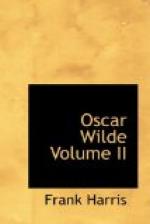I can scarcely speak in moderation of the magnanimity, humanity and charity of John Dupoirier, the proprietor of the Hotel d’Alsace. Just before I left Paris Oscar told me he owed him over L190. From the day Oscar was laid up he never said anything about it. He never mentioned the subject to me until after Oscar’s death, and then I started the subject. He was present at Oscar’s operation, and attended to him personally every morning. He paid himself for luxuries and necessities ordered by the doctor or by Oscar out of his own pocket. I hope that —— or —— will at any rate pay him the money still owing. Dr. Tucker is also owed a large sum of money. He was most kind and attentive, although I think he entirely misunderstood Oscar’s case.
Reggie Turner had the worst time of all in many ways—he experienced all the horrible uncertainty and the appalling responsibility of which he did not know the extent. It will always be a source of satisfaction to those who were fond of Oscar, that he had someone like Reggie near him during his last days while he was articulate and sensible of kindness and attention....
ROBERT ROSS.
CRITICISMS
BY ROBERT ROSS
Vol. I. Page 80 Line 3. I demur very much to your statement in this paragraph. Wilde was too much of a student of Greek to have learned anything about controversy from Whistler. No doubt Whistler was more nimble and more naturally gifted with the power of repartee, but when Wilde indulged in controversy with his critics, whether he got the best of it or not, he never borrowed the Whistlerian method. Cf. his controversy with Henley over Dorian Gray.
Then whatever you may think of Ruskin, Wilde learnt a great deal about the History and Philosophy of Art from him. He learned more from Pater and he was the friend and intimate of Burne-Jones long before he knew Whistler. I quite agree with your remark that he had “no joy in conflict” and no doubt he had little or no knowledge of the technique of Art in the modern expert’s sense.
[There never was a greater master of controversy than Whistler, and I believe Wilde borrowed his method of making fun of the adversary. Robert Ross’s second point is rather controversial. Shaw agrees with me that Wilde never knew anything really of music or of painting and neither the history nor the so-called philosophy of art makes one a connoisseur of contemporary masters. F.H.]
Page 94. Last line. For “happy candle” read “Happy Lamp.” It was at the period when oil lamps were put in the middle of the dinner table just before the general introduction of electric light; by putting “candle” you lose the period. Cf. Du Maurier’s pictures of dinner parties in Punch.




